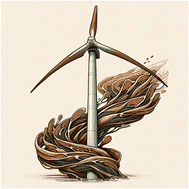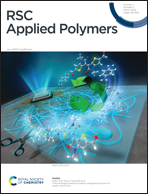An algae-derived partially renewable epoxy resin formulation for glass fibre-reinforced sustainable polymer composites†
Abstract
Utilization of sustainable feedstocks to fabricate renewable thermosetting epoxy resins has been of great interest recently; however, their translation into composite structures and benchmark comparisons are poorly understood. Phloroglucinol is a phenolic molecule obtained from brown algae, and its epoxidized form is a high viscosity, high reactivity monomer. In this study, the potential of epoxidized phloroglucinol as a laminating resin was examined in comparison with a bisphenol A diglycidyl ether (BADGE) epoxy monomer employing the Epikure 04908 linear amine hardener system. Utilization of a reactive diluent for PHTE resin was necessary for room temperature laminating applications to reduce viscosity, and the thermomechanical properties of PHTE-based resins and composites are superior to those of BADGE systems.

- This article is part of the themed collections: Sustainable Development Goal 12: Responsible Production and Consumption and Sustainable Composites

 Please wait while we load your content...
Please wait while we load your content...